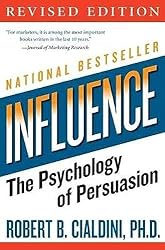Weekly Bookmarks
96th Edition – December 6, 2020
Pay every debt as if God wrote the bill.
Ralph Waldo Emerson
1. The Business of Integrity
I was impressed with a local business owner this week who was educating my wife on winter maintenance for our outdoor hot tub. He spent more than 20 minutes explaining what she could do to treat our system for the upcoming winter months which meant he would probably lose out on some business (right now).
While we don’t need him now, we’ll be customers for life with this service professional. I’ll also be bragging about him behind his back.
2. The Law of Reciprocity Revisited
Every business leader, follower, teacher, kid, and anyone else I left out should read Cialdini’s, Influence. In chapter 2, he explains the law or rule of reciprocity:
By virtue of the reciprocity rule, then, we are obligated to the future repayment of favors, gifts, invitations, and the like.
If you do a web search on the law of reciprocity, you’ll find hundreds if not thousands of articles explaining what the rule is and how to apply it in business. You’ll be hard-pressed to find out what causes this natural law or instinct for others wanting to reciprocate when they have received an unwanted gift from another. Even Cialdini is silent on this matter.
As I think about the hot tub specialist above, I don’t think the law of reciprocity was driving his actions. I think something else was at play – the golden rule – treating others the way he wants to be treated. That’s the business of integrity.

3. Focusing on All Stakeholders
One hundred years from now, a business anthropologist and historian will call this the period of putting the culture and team members first. I’ll never get that concept.
The hot tub guy above was not putting his team first as it meant a lost business opportunity (at least for now). Instead, he was focusing on our household’s budget.
I think Whole Foods has figured this concept out in who goes first – no one. Instead, all stakeholders are a priority. If you check out their core values page, they mention customers, team members, suppliers, and shareowners by creating profits and prosperity. They don’t rank these stakeholders.
I have a theory on the over-tilt on culture and team member focus – it’s easy. Focusing on all stakeholders simultaneously – now that’s hard.
Focusing first and only on customers is easy too. A monumental effort is required to focus on more than just customers.
4. Switching Gears to an IPO Guru
I just pre-ordered Steve Cakebread’s new book, The IPO Playbook. I’ll also be interviewing him next week for a January podcast episode.
Steve may not be a household name, but he was the CFO who took Salesforce public along with a couple of other companies.
When should a company think about going public? According to Steve in the second chapter:
- when sales exceed $50 million and growing at least 40% annually
- the company has the ability to sustain a 10- to 15-year growth plan
- the size of the market is significant and a large slice can be captured by its current business model
- the company has the potential to achieve a $1 billion run rate, profitability, and cash flow break-even within 5 to 10 years from the IPO
I’ve never worked on an IPO and will probably never get the chance to do so. But this book is readable and digestible. The book will be available this week on December 10.

5. As You Wrap Up Your 2021 Budget
If time permits, create a list of all of your FTEs and add three columns after the team member. The column titles are for the following types of work:
- smarter ideas – this is just-do work and day-to-day problem solving
- core innovation projects – incremental innovations for existing offerings or systems
- leap innovation projects – disruptive innovations
The list above is from the book, Driving Eureka! by Doug Hall. Many small businesses (my non-empirical data assessment) spend 100% of their time on smarter ideas which is the day-to-day work.
Doug says the best companies spend 85% of their time in the first two buckets and the remaining 15% with leap projects. If not, the business will eventually die.
Doug was my guest on this week’s CFO Bookshelf podcast, and the main topic was innovation engineering.
Incidentally, Jump Start Your Business Brain by Doug Hall is one of my Top 20 favorite business books and it’s been named to several best 100 business book lists of all time.

Recent Bookmarks – 95 |94 |93
Thank You For Reading. Thank you for making this a successful newsletter.
If you like the content above and the posts at CFO Bookshelf, may I ask a favor? Feel free to share this with other readers along with commenting on your favorite blog posts on LinkedIn, Twitter, or Facebook.
Always be learning and growing.

Leave a Reply